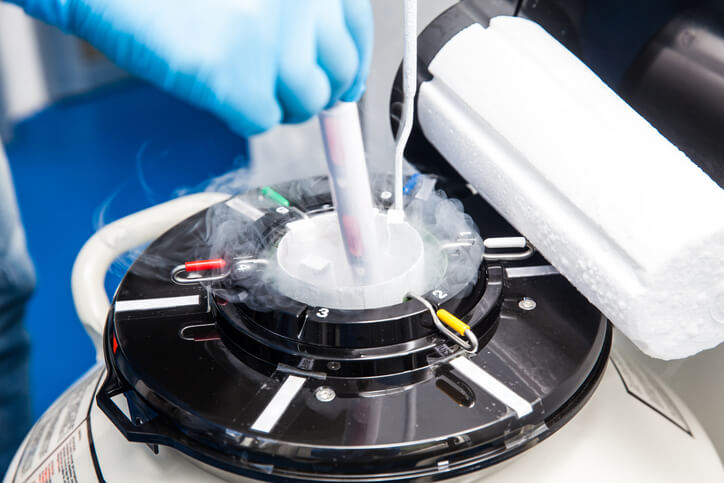Like many in the assisted reproductive technology world, American Surrogacy was extremely shocked and saddened to hear about the recent failure of two embryo cryopreservation and fertility clinics this week — putting more than 500 families’ dreams of having biological children at risk.
The Associated Press reported that a clinic in Cleveland, Ohio, and a clinic in San Francisco — both of which were storing thousands of frozen embryos — experienced failures in their storage tanks on March 4. Low amounts of liquid nitrogen in certain tanks may have damaged the cryopreserved embryos and eggs inside, and officials from the clinics are still investigating. It’s being reported as a “bad, bad, bad coincidence.”
For the families affected by these damages, it’s more than just a loss of the thousands of dollars they’ve spent on the in vitro fertilization process — it’s the loss of their opportunities to have a biological child. Knowing their loss will implement new backup measures and safety procedures for other couples may not be much of a comfort.
So, what is left for these families after their frozen embryo storage fails, and all the work they’ve put into freezing their embryos or eggs is for naught?
Fortunately, there are a few alternative family-building options still available.
Surrogacy with a Donated Gamete
Infertility is a tricky issue. While two-thirds of cases can be traced to reproductive issues from either the man or the woman in a couple, one-third of cases are either a combination of factors or un-diagnosable.
Intended parents who go through IVF and freeze embryos due to one partner’s reproductive problems could conceivably still have a biological child if their frozen embryos are compromised. They can create fresh embryos with a donated gamete. If an intended mother cannot carry a pregnancy safely to term (or if there is no intended mother), an intended parent can pursue surrogacy with that fresh embryo.
While surrogacy with fresh embryos is rarer than surrogacy with frozen embryos, medical professionals can still complete this process for those in need — such as intended parents whose plans of pursuing IVF with frozen embryos are compromised. If an egg or sperm donor is needed, a fertility clinic or donor bank can be used, and medical professionals will guide intended parents through this process.
So, why should those moving forward from the failure of freezing embryos choose surrogacy with a donated gamete?
- It allows one intended parent to be genetically related to the baby.
- It allows LGBT intended parents to have a genetically related child.
- It protects an intended mother who cannot carry a pregnancy to term safely.
- It allows intended parents to be involved with the development of their unborn baby, such as being there for ultrasounds and the birth of their child.
If you are interested in pursuing a fresh cycle transfer surrogacy with an inability to use your cryopreserved embryos, please contact American Surrogacy today. Our surrogacy specialists can discuss your situation and your options in depth to help you find the path that is right for you. Recovering from losses due to improper embryo freezing can be a difficult emotional and financial time, but our specialists and our community are here to support you through it.
Adoption
Surrogacy is not the right family-building option for everyone, especially for intended parents who have spent thousands of dollars previously freezing embryos and are cautious about spending more on assisted reproductive technologies. It’s a valid concern. While our surrogacy program guarantees you will have a baby, there is unfortunately no guarantee as to how many rounds this at-times-tricky process can take before success is found.
However, failed freezing of embryos does not mean a couple cannot become parents. After all, parenting is less about biological connection than it is about genuine care and proper raising of a child. This is why so many great potential parents turn to adoption — knowing that love is what truly makes a family, not genetics.
Hopeful parents can either choose a foster care adoption, an international adoption, or a private domestic infant adoption to add to their family. Many who desire to adopt a baby end up choosing the last path, and our sister agency American Adoptions can guide them through this process.
Adoption involves a pregnant woman choosing an adoptive family for her baby and, typically, maintaining some kind of open adoption contact as the baby grows up.
So, why do hopeful parents choose adoption after failed embryo cryopreservation?
- They are comfortable having no genetic connection to their child.
- They do not wish to spend thousands more dollars on assisted reproductive technologies.
- They want to give a child in need a loving home with their family.
- They are comfortable with and excited to have a relationship with their baby’s birth mother.
Many adoptive families have gone through infertility struggles before deciding on adoption, and adoption specialists are trained to counsel these families through the grief of the infertility process. To talk to a specialist about whether adoption is right for you, call 1-800-ADOPTION today.
Moving forward from a loss of frozen embryos — such as in the two notable clinic failures listed above— can be an emotionally difficult thing to do. Remember, just because you don’t have any frozen embryos does not mean you can’t be a parent.
There is a family-building path out there for you. Let us help you find it.
